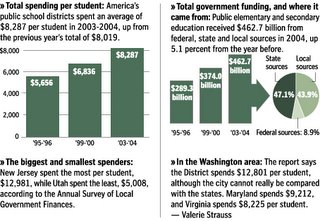The Washington Post included this graphic on the rising cost of education in the online edition. I'd go to the living room to see if it was in the print edition too, but does anyone read the print edition for anything but sales and coupons anymore? While not trying to be crass, does it really come as a shock to anyone that the costs of public education are going up? The requirements and expectations we have put on our schools over the past 20 years (and possibly longer, but, education not being my baliwick, I can't really say) have grown while our criticisms of it have also grown.
While not trying to be crass, does it really come as a shock to anyone that the costs of public education are going up? The requirements and expectations we have put on our schools over the past 20 years (and possibly longer, but, education not being my baliwick, I can't really say) have grown while our criticisms of it have also grown.
Teacher pay is usually a primary scape-goat, but what about special education, the number of kids that are 'special needs' because their parents aren't willing or capable of doing the job of raising their children? What about the "great melting pot" effect? It's one of America's great strengths, but it also costs us a lot: we accept immigrants from all corners of the world. Immigrants whose children don't speak English--yet. So they have to learn English at school. Not necessarily a big deal 50 years ago when our ethnic enclaves were fairly uniform: northern Europeans in Minnesota; Hispanics in the Southwest; Asians tended to stay on the coasts. Well, welcome to globalization. Everyone is everywhere, and so the challenge of teaching kids english (so they can get good jobs, pay taxes, and be upstanding Americans--rather than go to jail) goes up as well.
OH, and I forgot one of the largest pieces. We've begun to recognize that forced memorization is not necessarily the best teaching method. Many children (and adults) learn much more by actually doing something that simply reading about it or listening as it is described. It costs more to give children the opportunity to learn by doing (but actually learn) rather than just go through the motions of learning as so many countries' education systems encourage.
I've written about it before, and undoubtedly will again, but education is one of this country's greatest stregnths. We do it better than other countries precisely because we teach everyone. Precisely because we ensure that we teach to the kids who need to see, hear, or do to learn; not just the kids who have a natural gift for picking up lessons from books and multiplication tables. If we as a society decide that it costs too much to educate our children in a way that not only prepares them to operate in the world we have created for them, but also educates them in such a way that prepares them to thrive in it, then we will have failed as a civilization--and we'll all have to spend a lot more time studying Hindi and Mandarin.
Sunday, April 09, 2006
The rising cost of "it's someone elses problem"
Posted by John at Sunday, April 09, 2006
Subscribe to:
Post Comments (Atom)
1 comment:
I think you make a really interesting point, especially about the strengths of the American education system. But I would also recommend that you broaden your argument to look at what kind of education we are giving our students. At the levels of higher education, there is a debate between teaching students to have jobs and teaching students to think...it explains the decline in liberal arts programs and the increase in bizarre "tech" like programs - any thoughts as to how we can reconcile the problem so that we are both teaching our students to think and equipping them to succeed? It seems to me that your argument about the needs of the educational system is sound, but you can't ignore the capitalist pull to teach like other countries do. I would also argue that we don't actually "teach" everyone, we just pretend to...but that's a subject for another day.
Post a Comment